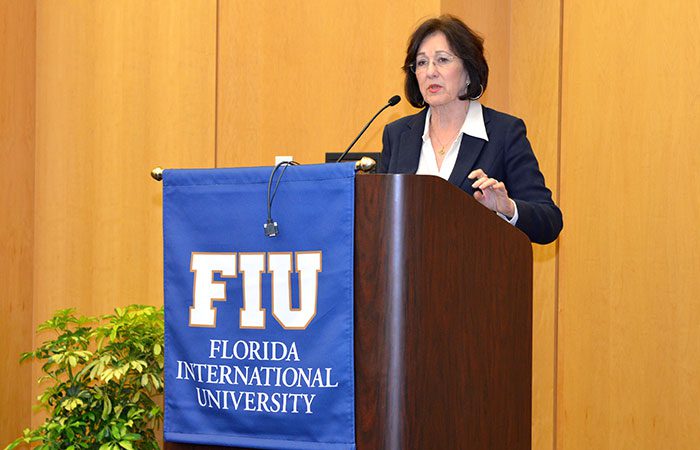

Patricia Gándara, a professor of graduate education and co-director of the UCLA Civil Rights Project/Proyecto Civil shares the results of her research on how balanced bilinguals are more successful.
In a globalized, digitized world, new research shows the key to employability and higher earnings hinges on something South Florida residents learned was crucial long ago – being equally fluent in more than one language.
“The perception of some across the country is that immigrants are a drain on the economy,” said University of California Los Angeles Professor Patricia Gándara, who was invited to speak at FIU Feb. 10 as part of the College of Education’s Dean’s Speakers Series.
“Evidence suggests the exact opposite is true,” she added. “Those who learned English and maintain their native language earn more, have higher status jobs, and it also means they will pay more taxes and not resort to social service programs for support.”
Gándara, co-author of a new book showcasing research on the performance of bilinguals, “The Bilingual Advantage: Language, Literacy, and the U.S. Labor Market,” also is co-director of the Civil Rights Project/Proyecto Derechos Civilesat UCLA.
Her book combines research from multiple disciplines including anthropology, economics, education, linguistics and sociology to study how bilingualism affects the economics of a new generation of bilinguals entering a globalized workforce in the digital age.
For at least one FIU student, Gándara provided validation for her desire to remain proficient in her native language while she perfected English.
“I came from Cuba and I wanted to keep my language and continue working in my community,” said Mayeluz Navarro, 30, a professional translator and master of foreign language education student. “Lots of parents think that to be successful you have to learn English – so it’s English only. They need to learn that it’s also important to maintain your native language.”
At first, Gándara shocked the audience by sharing that prior researched showed there was no economic advantage for bilingual members of society, and in fact, they earned less.
However, Gándara said the original studies were flawed because they focused on census data that did not accurately distinguish the level of language proficiency among respondents. This is key because balanced bilinguals – those who are equally proficient in both languages – tend to do far better than others who were more literate in one language compared to the other.
“Among the greatest assets immigrants bring to this country are their languages – especially when they are world languages spoken in different countries,” she said.
“Bilingual students show ability to focus and see things from different perspectives. Socially, they are more interested in other cultures and are comfortable with diversity. Those are skills that employers are telling us are needed in this economy.”
We shouldn’t rest easy, Gándara warned: This advantage could disappear within three generations if society didn’t take steps to incorporate bilingual education in schools.
“As a second generation Cuban-American, I felt inspired,” said Yuliette Antunez, 29, who is working toward a master of early childhood education. “When I have children they’re going to be speaking Spanish all the time. It’s important for them to know the importance of their culture.”





